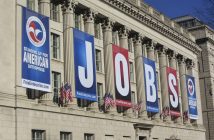Not satisfied that the U.S. is home to more immigrants than any nation on Earth, the CEO of Domino’s Pizza is hungry for more. “We need immigration in our industry to continue to have enough team members,” says Ritch Allison. But in his endless quest for evermore migrants, whose team is he on?
More than 40 million people currently living in the U.S. were born in another country, accounting for about one-fifth of the world’s migrants, according to the Pew Center. Since 1965, the number of immigrants to America has more than quadrupled. Nearly one in seven U.S. residents are immigrants, and that ratio continues to climb, with green cards granted to more than 1.2 million legal immigrants annually.
While Allison pleads for more foreign workers, millions of native-born Americans and immigrants aren’t working at all. Recent reports listed 7.3 million Americans and 1.5 million immigrants as unemployed. An additional 9.4 million immigrants ages 16-64 were classified as neither working nor looking for work. (None of these statistics includes illegal aliens, estimated by FAIR to number 14.5 million.)
Fact is: There is not a labor shortage. Instead, there is a shortage of honorable CEOs willing to pay market wages.
Though many immigrants come here to work, they typically do so for lower pay. This wage suppression works nicely for bottom-line executives like Allison. Since 1970, the percentage of immigrants in the U.S. workforce has more than tripled to 30 million. Not coincidentally, the rising tide of foreign workers has come with a decades-long stagnation of American wages.
(It’s worth noting here that a Domino’s franchise was ordered to pay $3 million to 3,000 of its delivery drivers over claims of unpaid wages.)
Businesses that rely on low-paid immigrants inevitably shift their workers’ social welfare costs onto taxpayers. The Center for Immigration Studies notes, for example, that immigrants would take an outsized share of cash payments under a vastly expanded Child Tax Credit program. (That program, by the way, abolishes all work requirements.)
The U.S. immigration system, heavily reliant on diversity lotteries and family-based chain migration, is not designed to deliver the skilled and educated workforce that American businesses need to succeed. CEOs like Allison would be better served by focusing on quality, not quantity.
If they’re truly team players for America, they could make a difference by placing an order for the RAISE Act, a merit-based admissions policy that selects applicants who can best contribute to the U.S. economy. But sadly, Allison seems to be hoping the federal government will adopt Dominos’ tagline: “We’ll have your immigrant worker there in 30 minutes or less, or the next one is on us!”





1 Comment
Pingback: Domino’s Immigration Combo: More Foreign Labor for Less Dough - 198 Immigration News